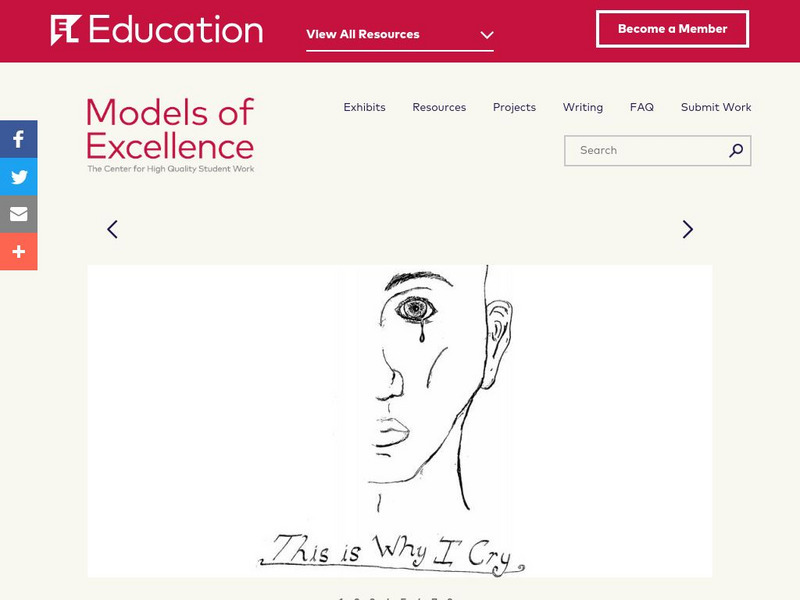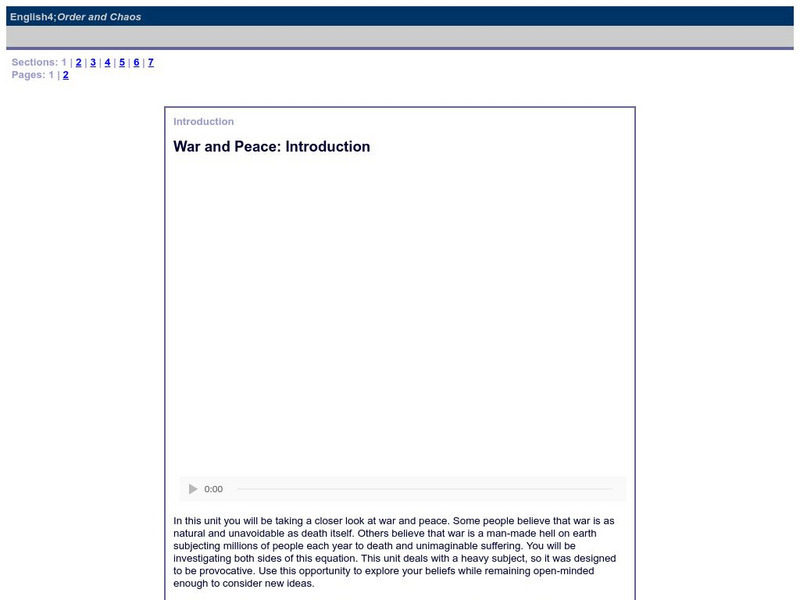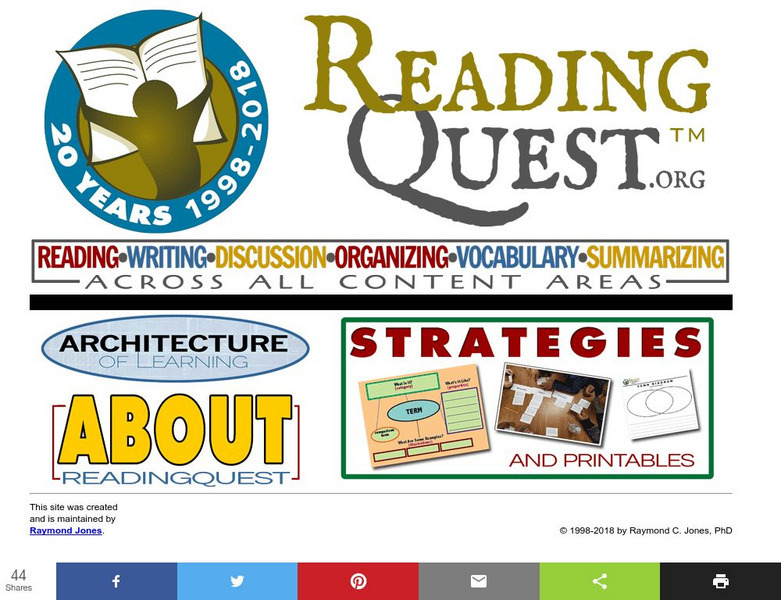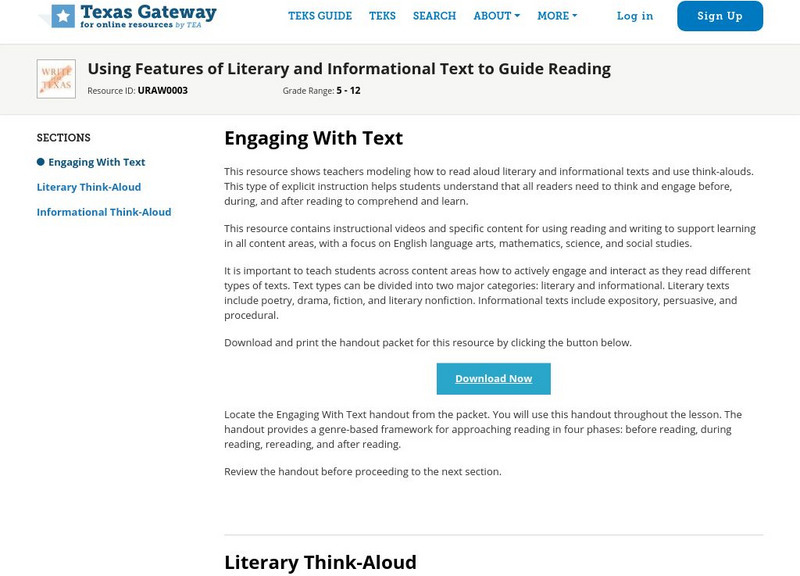Hi, what do you want to do?
CommonLit
Common Lit: "Sometimes, History Is Sadness" by David White
CommonLit.org is a wonderful resource to use in a Language Arts classroom. Each story or article is accompanied by guided reading questions, assessment questions, and discussion questions. In addition, students can click on words to see...
CommonLit
Common Lit: Financial Literacy
CommonLit.org is a wonderful resource to use in a Language Arts classroom. Each story or article is accompanied by guided reading questions, assessment questions, and discussion questions. In addition, students can click on words to see...
CommonLit
Common Lit: Egyptian Social Structure
CommonLit.org is a wonderful resource to use in a Language Arts classroom. Each story or article is accompanied by guided reading questions, assessment questions, and discussion questions. In addition, students can click on words to see...
Huntington Library
Huntington Library: The Widening World of Books and Readers [Pdf]
In this lesson, 7th graders examine the widespread impact of the printing press on promoting literacy and spreading ideas across societies and between countries.
Huntington Library
Huntington Library: The Development of Writing and Books: Part Ii [Pdf]
In this lesson, students examine early civilizations and the evolution of written language, at different early methods used to record information in writing, how these methods evolved, and at the impact of books on societies.
EL Education
El Education: This Is Why I Cry
Students gain a deeper understanding of slavery by creating an accurate portrayal of a character from history. Each historical character file they create contains a portrait, a biographical narrative, a character map, a bibliography, and...
CommonLit
Common Lit: "Emmett Till" by Jessica Mc Birney
CommonLit.org is a wonderful resource to use in a Language Arts classroom. Each story or article is accompanied by guided reading questions, assessment questions, and discussion questions. In addition, students can click on words to see...
Department of Defense
Do Dea: English 4; Order and Chaos
A learning module asking students to analyze different types of texts, use literary terms, write a persuasive essay, and practice grammar and vocabulary skills all within themes related to order and chaos or war and peace.
Department of Defense
Do Dea: English 4; Utopia
A learning module asking students to analyze different types of texts, connect literature to events and experiences, use various writing skills, deconstruct media, practice grammar and vocabulary skills, and analyze point of view,...
Other
Carson Newman College: Close Reading of a Literary Passage [Pdf]
Provides a number of questions that students can ask themselves about a literary passage when doing a "Close Reading" and following this with an organized piece of writing. CCSS.ELA-Literacy.CCRA.R.5
Association for Supervision and Curriculum Development (ASCD)
Ascd: Building Literacy in Social Studies: Ch 1: Reading Social Studies Texts
Article provides excellent tips and strategies for building comprehension and critical thinking skills in Social Studies. It describes some of the challenges students have with reading and understanding their textbooks.
Other
Reading Quest: Making Sense of Social Studies
Teaching students to read well in areas other than language arts requires teaching and reinforcing the kinds of reading strategies taught here. There are 27 strategies, ranging from brainstorming to word mapping. The site includes PDF...
Better Lesson
Better Lesson: Analyzing Text Complexity of Non Fiction Sources
This lesson will help students read and comprehend nonfiction, specifically biographies, through determining criteria for text complexity. Included is a PDF and Smart Notebook titled Determining Text Complexity, and an example of a...
Better Lesson
Better Lesson: Cities in Mesopotamia: Understanding a Complex Text
In this instructional activity, 6th graders use details from a nonfiction article to create a visual representation and then, from that visual, provide evidence that demonstrates their understanding of the text. Includes samples of...
CommonLit
Common Lit: "On Tragedy" by Aristotle
In this chapter from "Poetics", Aristotle seeks to define "tragedy" as it relates to literature and human emotion. A specific purpose for reading and vocabulary notes are provided. This site offers links to paired texts, questions and...
Other
City College: Skills for Life: Reading for a Purpose
This resource offers 11 exercises with variety of everyday reading passages such as letters, recipes, classified ads, etc. Students read the passage and answer multiple choice questions about its purpose.
City University of New York
Cuny: E Resource Center: Course Tutorials: Reading Your Textbook
A tutorial consisting of seven exercises showing different text structures used in textbooks. Learn how they organize information to help students locate specific details and how to take notes based on information within a textbook.
The Newberry Library
Newberry Library: Daily Life in Early Modern France
Primary source documents are used in the exploration of the written word asks how handwritten documents shaped life in the early modern period and what can they tell us about the experiences of early modern people.
The Newberry Library
Newberry Library: Literature of the American Civil War
Learning module uses primary resources to take a look at the literature published during the Civil War and examines how it helped make sense of the war and the profound changes brought about.
The Newberry Library
Newberry: Shakespeare's the Tempest and Utopias of the European Renaissance
Newberry Library learning module uses primary source material of Shakespeare in a lesson on how Renaissance writers and artists portrayed European exploration of America. Students read excerpts from works of Renaissance literature to...
The Newberry Library
Newberry Library: The World of Don Quixote
Learning module using primary resources in which students explore how Cervantes' Don Quixote respond to the social conditions and literary traditions of early modern Spain.
Other
Read Print Publishing: Full Text Literature
Full text and free online versions of plays, essays, fiction, nonfiction, poetry and short stories. Search by favorite author or title and immediately find your text of choice.
PBS
Pbs Learning Media: Learning From the People Collection
The ECHO Collection provides rich, multi-disciplinary educational resources in science, literacy and language arts, fine art, and social studies. The combined skills, experience, and collections of our six institutions provide...
Texas Education Agency
Texas Gateway: Using Features of Literary & Informational Text to Guide Reading
A learning module that teaches students about using text features to guide reading in three mini lessons: Engaging with Text, Literary Think-Aloud, and Informational Think-Aloud. Download a PDF with lesson plans and printable handouts...


















